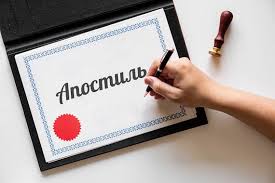Processing
In the modern world, where globalization and international relations are becoming increasingly relevant, apostille on documents becomes a necessary procedure for many Ukrainians. An apostille is a special stamp or visa that legalizes documents for recognition of their legality in countries that have signed the Hague Convention on Apostille of Public Documents.
The process of apostille certification may seem complex and confusing, so in this article, we will discuss the main issues related to apostilization of documents for Ukrainians and provide useful tips.
What is an apostille and why is it needed?
An apostille is a special mark placed on public documents such as birth certificates, marriage certificates, divorce certificates, salary certificates, diplomas, etc. It confirms the legality and authenticity of such documents outside of Ukraine. An apostille simplifies the process of document recognition in foreign countries and ensures their legality before authorities and organizations with which you have dealings.
How to apostille a document?
To apostille documents, you need to apply to the competent authority in your country authorized to issue apostilles. In Ukraine, these powers are vested in the Ministry of Justice of Ukraine or its territorial subdivisions. You can order an apostille both in person and remotely through electronic or postal services. The simplest way is to personally visit the relevant department of the Ministry of Justice or send a request by mail with the necessary documents.
Which documents require apostille?
Usually, apostilles are required for public documents issued by government agencies or civil registration authorities. Among them may be:
- Birth, marriage, divorce certificates;
- Educational documents such as diplomas, certificates;
- Documents regarding property rights, such as real estate purchase agreements;
- Personal status documents such as passports, certificates of no criminal record, etc.
It is important to note that private documents that do not have the status of public documents usually do not require apostille.
Useful tips for apostilling documents:
- Before starting the apostille process, check if the country you plan to travel to or deal with is a party to the Hague Convention on Apostille of Public Documents.
- Contact the competent authority in advance, as the apostille process may take some time.
- Familiarize yourself with the requirements and documents necessary for apostille to avoid unnecessary delays or mistakes.
- Adhere to the established rules for translating documents if they are not in Ukrainian or English. Translations often need to be notarized or apostilled separately.
- Choose a reliable intermediary or agent if you are ordering an apostille remotely. Make sure they have sufficient knowledge and experience in the field of apostilling documents.
Apostille cost Ukraine
When obtaining an apostille, a fee is usually charged, which may vary depending on the country and the authority performing the procedure. It is also worth considering that an apostille has a limited validity period. It remains valid for a certain period, which may also vary depending on the country. Make sure you adhere to deadlines and update the apostille in a timely manner if necessary.
Apostilling documents is an important procedure for Ukrainians dealing with foreign countries or planning international travel. It helps to confirm the legality and authenticity of documents before international organizations, foreign institutions, and authorities.
Remember that the rules and procedures for apostilling may change depending on the country and time. It is recommended to always check for up-to-date information and consult competent authorities for specific guidance and instructions regarding apostille of documents for Ukrainians. Remember that a properly executed apostille will allow you to easily use your documents abroad and simplify the process of their recognition as legal in foreign countries.





























